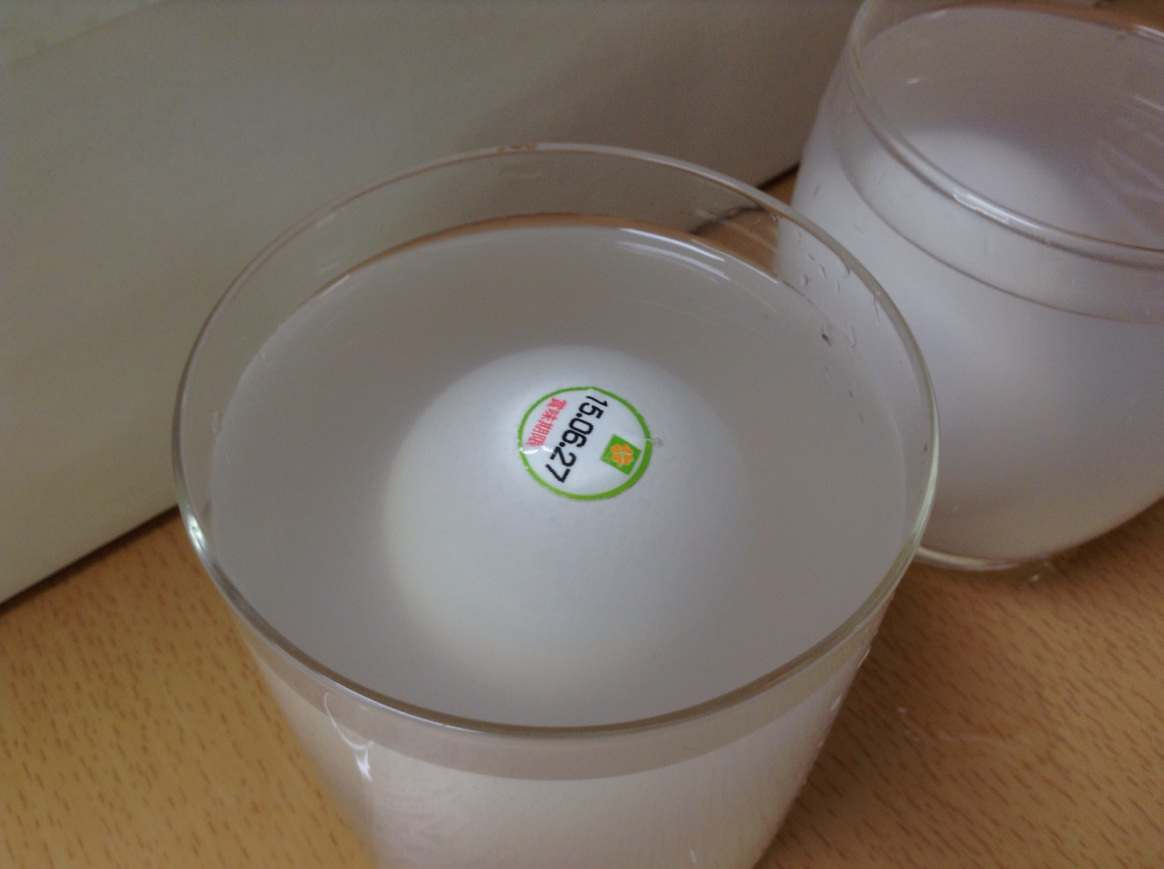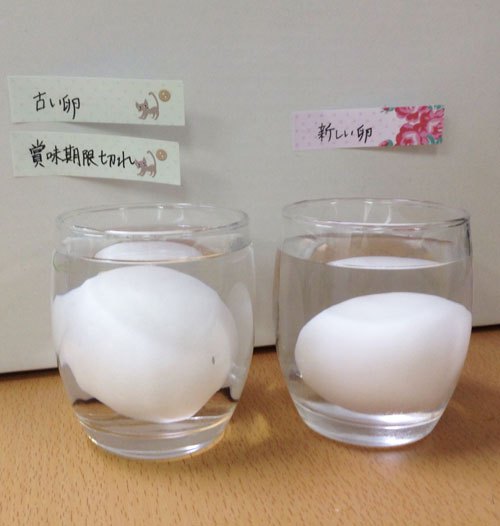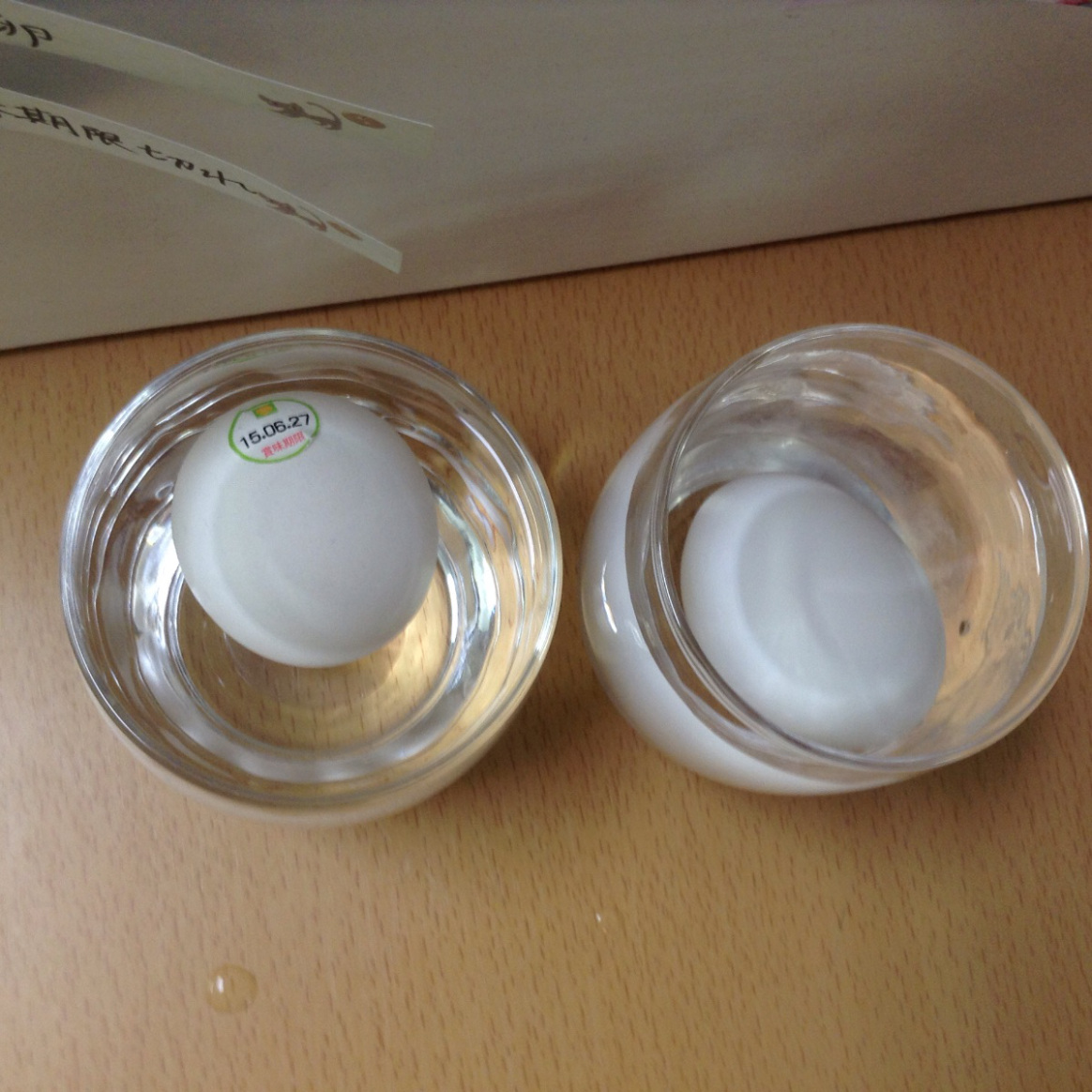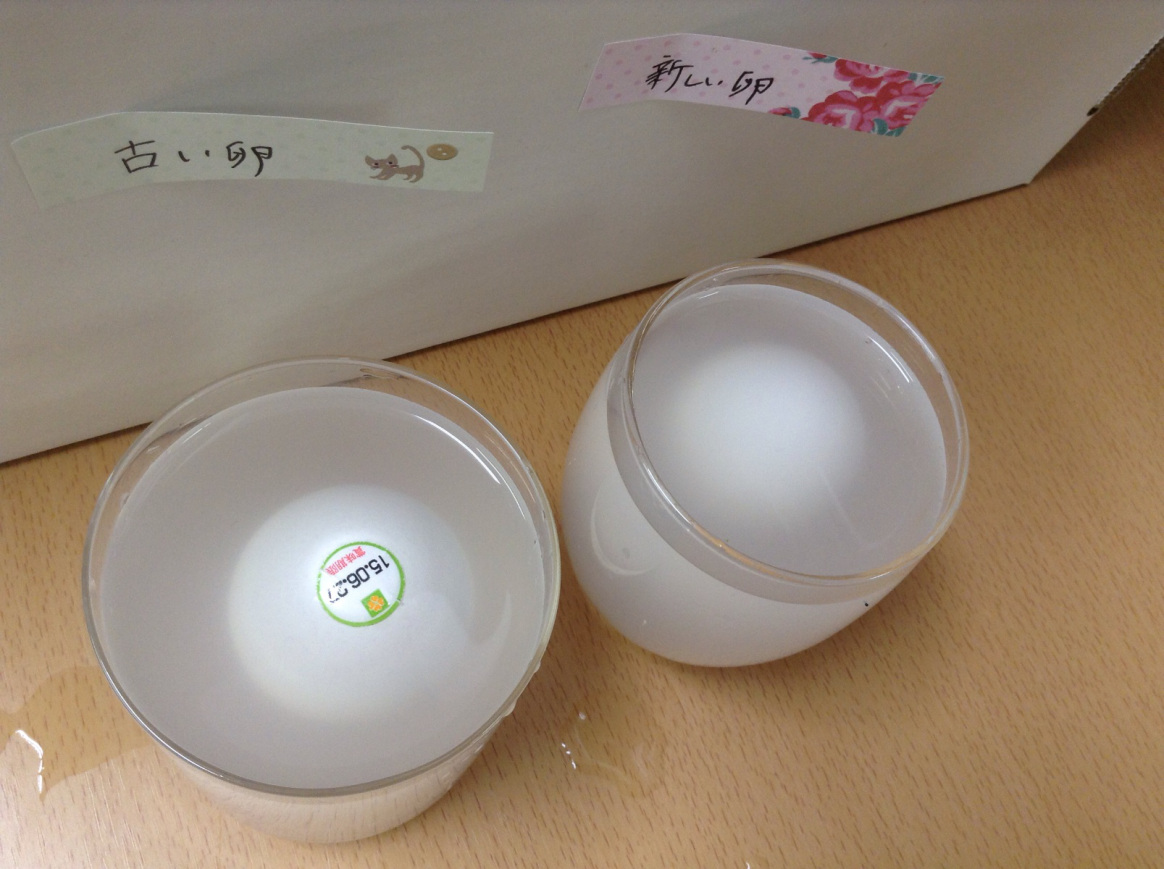
Listen guys, unless you have a huge surplus of pants hangers, Q-tips, dental floss and whatever weird detritus that’s often recommended, a lot of so-called “lifehacks” – those hobo techniques for saving money and/or accomplishing some inane task with “readily available” household objects – are a bit impractical, if they even work at all.
But there’s one, at least, that seems like it could perfectly epitomize the intended convenience of the lifehack: Testing the freshness of eggs by just dropping them into a cup of water. We’ve all got water and a cup on hand and, so long as you’re a sentient human being and not, like, a family dog reading this on your owner’s tablet after you taught yourself English.
But does this egg trick really work? Impressed at having actually found a real, potentially useful lifehack, we took it upon ourselves to test it out. Here’s what we found.
First, let’s cover the basic idea behind this lifehack. According to multiple sources, eggs of varying freshness will float to various different degrees in a cup of water. The freshest of eggs will apparently sink down and land sideways on the bottom of a glass, while eggs of moderate freshness will sort of half-stand, half-sink, and a stale egg will stand on end at the bottom of a glass. A totally bad egg will, the wisdom goes, float at the surface of the water.
Like so:
While we’ve seen videos and commentary on the Internet that this method objectively does not work, the American Department of Agriculture apparently enthusiastically endorses it as a bulletproof test of egg freshness. Well, what better outlet to put the debate to bed than a random Asia news website, we thought.
Arming ourselves with a calendar (so you know we’re not cheating), and a pair of eggs – one completely fresh and one a few days past its best-by date, we set to work. We plunked our eggs into two cups of tap water and, lo and behold, the old egg did, in fact, float to the surface.
We found the effect to be even more pronounced when we used salt water, as the slightly increased buoyancy made the old egg really bob exaggeratedly to the surface.

The official explanation, apparently, for this phenomenon is that air pockets in the eggs expand as the eggs get older, making them more buoyant and smelly.
Go figure. We had always assumed that old eggs float because the now fully-formed embryo inside was doing its best to tread water.
Photos/Vine ©RocketNews24
[ Read in Japanese ]







 Got a bunch of old rice lying around? Let us show you how to revive it!
Got a bunch of old rice lying around? Let us show you how to revive it! We brave the should-be-abomination of raw egg and coffee, is it a taste sensation? 【Taste Test】
We brave the should-be-abomination of raw egg and coffee, is it a taste sensation? 【Taste Test】 We tried a Japanese egg steamer to achieve the perfect breakfast eggs without a stove
We tried a Japanese egg steamer to achieve the perfect breakfast eggs without a stove The Osaka taste sensation that no one in Osaka has ever heard of: Coffee & Raw Egg 【Taste Test】
The Osaka taste sensation that no one in Osaka has ever heard of: Coffee & Raw Egg 【Taste Test】 Does the Shirotama Maker kitchen gadget really create perfect instant ramen eggs?
Does the Shirotama Maker kitchen gadget really create perfect instant ramen eggs? Starbucks Japan releases first-ever Hinamatsuri Girls’ Day Frappuccino
Starbucks Japan releases first-ever Hinamatsuri Girls’ Day Frappuccino Japanese restaurant chain serves Dragon Ball donuts and Senzu Beans this spring
Japanese restaurant chain serves Dragon Ball donuts and Senzu Beans this spring Japan Extreme Budget Travel! A trip from Tokyo to Izumo for just 30,000 yen [Part 2]
Japan Extreme Budget Travel! A trip from Tokyo to Izumo for just 30,000 yen [Part 2] The fish in rural Fukui that rivals Japan’s most auspicious sea bream
The fish in rural Fukui that rivals Japan’s most auspicious sea bream Which convenience store onigiri rice balls are the most popular? Survey reveals surprising results
Which convenience store onigiri rice balls are the most popular? Survey reveals surprising results Tokyo street sweets: The must-snack treats of Nakano’s Refutei
Tokyo street sweets: The must-snack treats of Nakano’s Refutei Rental grandma service growing in Japan, can help cook or break up with boyfriends
Rental grandma service growing in Japan, can help cook or break up with boyfriends Japan has only one airport named after a samurai, so let’s check out Kochi Ryoma【Photos】
Japan has only one airport named after a samurai, so let’s check out Kochi Ryoma【Photos】 Starbucks Japan releases new sakura goods and drinkware for cherry blossom season 2026
Starbucks Japan releases new sakura goods and drinkware for cherry blossom season 2026 Beautiful website catalogues some of Japan’s most ornate manhole covers
Beautiful website catalogues some of Japan’s most ornate manhole covers Highest Starbucks in Japan set to open this spring in the Tokyo sky
Highest Starbucks in Japan set to open this spring in the Tokyo sky The 10 most annoying things foreign tourists do on Japanese trains, according to locals
The 10 most annoying things foreign tourists do on Japanese trains, according to locals Tokyo Skytree turns pink for the cherry blossom season
Tokyo Skytree turns pink for the cherry blossom season Yakuzen ramen restaurant in Tokyo is very different to a yakuza ramen restaurant
Yakuzen ramen restaurant in Tokyo is very different to a yakuza ramen restaurant Shibuya Station’s Hachiko Gate and Yamanote Line stairway locations change next month
Shibuya Station’s Hachiko Gate and Yamanote Line stairway locations change next month Starbucks Japan adds new sakura Frappuccino and cherry blossom drinks to the menu
Starbucks Japan adds new sakura Frappuccino and cherry blossom drinks to the menu Japan Extreme Budget Travel! A trip from Tokyo to Izumo for just 30,000 yen [Part 1]
Japan Extreme Budget Travel! A trip from Tokyo to Izumo for just 30,000 yen [Part 1] Japan’s new “Cunte” contact lenses aren’t pronounced like you’re probably thinking they are
Japan’s new “Cunte” contact lenses aren’t pronounced like you’re probably thinking they are Japan’s newest Shinkansen has no seats…or passengers [Video]
Japan’s newest Shinkansen has no seats…or passengers [Video] Foreigners accounting for over 80 percent of off-course skiers needing rescue in Japan’s Hokkaido
Foreigners accounting for over 80 percent of off-course skiers needing rescue in Japan’s Hokkaido Super-salty pizza sends six kids to the hospital in Japan, linguistics blamed
Super-salty pizza sends six kids to the hospital in Japan, linguistics blamed Starbucks Japan unveils new sakura Frappuccino for cherry blossom season 2026
Starbucks Japan unveils new sakura Frappuccino for cherry blossom season 2026 Foreign tourists in Japan will get free Shinkansen tickets to promote regional tourism
Foreign tourists in Japan will get free Shinkansen tickets to promote regional tourism Take a trip to Japan’s Dododo Land, the most irritating place on Earth
Take a trip to Japan’s Dododo Land, the most irritating place on Earth Naruto and Converse team up for new line of shinobi sneakers[Photos]
Naruto and Converse team up for new line of shinobi sneakers[Photos] Is China’s don’t-go-to-Japan warning affecting the lines at a popular Tokyo gyukatsu restaurant?
Is China’s don’t-go-to-Japan warning affecting the lines at a popular Tokyo gyukatsu restaurant? Survey asks foreign tourists what bothered them in Japan, more than half gave same answer
Survey asks foreign tourists what bothered them in Japan, more than half gave same answer Japan’s human washing machines will go on sale to general public, demos to be held in Tokyo
Japan’s human washing machines will go on sale to general public, demos to be held in Tokyo Starbucks Japan releases new drinkware and goods for Valentine’s Day
Starbucks Japan releases new drinkware and goods for Valentine’s Day We deeply regret going into this tunnel on our walk in the mountains of Japan
We deeply regret going into this tunnel on our walk in the mountains of Japan Studio Ghibli releases Kodama forest spirits from Princess Mononoke to light up your home
Studio Ghibli releases Kodama forest spirits from Princess Mononoke to light up your home Major Japanese hotel chain says reservations via overseas booking sites may not be valid
Major Japanese hotel chain says reservations via overseas booking sites may not be valid Put sesame oil in your coffee? Japanese maker says it’s the best way to start your day【Taste test】
Put sesame oil in your coffee? Japanese maker says it’s the best way to start your day【Taste test】 No more using real katana for tourism activities, Japan’s National Police Agency says
No more using real katana for tourism activities, Japan’s National Police Agency says Can this cushion really protect an egg from being sat on? How about a few punches?
Can this cushion really protect an egg from being sat on? How about a few punches? We found the prettiest TKG ever at a restaurant specializing in raw eggs on rice in Tokyo
We found the prettiest TKG ever at a restaurant specializing in raw eggs on rice in Tokyo The internet’s latest culinary masterpiece: Cup Noodle Steamed Egg【Taste Test】
The internet’s latest culinary masterpiece: Cup Noodle Steamed Egg【Taste Test】 Creepy creatures from the seabed that you can eat!【Taste Test】
Creepy creatures from the seabed that you can eat!【Taste Test】 Jellied Eggs, Pleasing to the Eye and Good for the Skin
Jellied Eggs, Pleasing to the Eye and Good for the Skin Does this egg timer from Japanese 100-yen store Daiso really work?
Does this egg timer from Japanese 100-yen store Daiso really work? How to turn your leftover instant ramen broth into delicious chawanmushi Japanese egg custard
How to turn your leftover instant ramen broth into delicious chawanmushi Japanese egg custard 7-Eleven Japan’s egg broth and rice may be the dream combination we’ve been missing【SoraKitchen】
7-Eleven Japan’s egg broth and rice may be the dream combination we’ve been missing【SoraKitchen】 Which Japanese convenience store has the best onsen tamago hot spring eggs?
Which Japanese convenience store has the best onsen tamago hot spring eggs? Restaurant specializing in tamago kake men (TKM), raw egg over noodles, opens in central Tokyo
Restaurant specializing in tamago kake men (TKM), raw egg over noodles, opens in central Tokyo We try Dom Dom Burger’s new limited-time-only Spicy Cod Roe Thick Egg Omelet Burger
We try Dom Dom Burger’s new limited-time-only Spicy Cod Roe Thick Egg Omelet Burger Testing Japan’s sold-online love potion: Mr. Sato makes his coworkers drink the romantic mixture
Testing Japan’s sold-online love potion: Mr. Sato makes his coworkers drink the romantic mixture Ramen egg showdown! Which Japanese convenience store makes the best nitamago?【Taste test】
Ramen egg showdown! Which Japanese convenience store makes the best nitamago?【Taste test】 Mr. Sato falls for the biggest egg sandwich he’s ever seen…but what does it look like inside?
Mr. Sato falls for the biggest egg sandwich he’s ever seen…but what does it look like inside? Blurring the bravery/stupidity line by taste-testing 16-year-old instant ramen 【Video】
Blurring the bravery/stupidity line by taste-testing 16-year-old instant ramen 【Video】 We taste-test the new chicken nugget French fry Cup Noodle【SoraNews24 taste test】
We taste-test the new chicken nugget French fry Cup Noodle【SoraNews24 taste test】 Which 100-yen shop product makes the best janky speaker? We test out 35 different items
Which 100-yen shop product makes the best janky speaker? We test out 35 different items